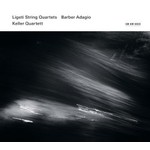
String Quartets (with Barber - String Quartet Op 11: Adagio)
 $40.00
Out of Stock
$40.00
Out of Stock6+ weeks add to cart
GYORGY LIGETI
String Quartets (with Barber - String Quartet Op 11: Adagio)
Keller Quartett
[ ECM New Series / CD ]
Release Date: Monday 24 June 2013
This item is currently out of stock. It may take 6 or more weeks to obtain from when you place your order as this is a specialist product.
"The Keller Quartet has an established track record in Ligeti's string quartets in concert performances, and the verve of their playing in this recording stands as witness to their familiarity with and affection for their fellow countryman's works. They made their recording of Ligeti's String Quartet No. 1 Métamorphoses nocturnes in 2007 on the first anniversary of the composer's death, and as a powerful tribute there are few recordings of the work which come close to this one. The Parker Quartet on Naxos (see review) is very good indeed and a superb budget alternative, but they don't achieve the Schwung the Keller Quartet has in that waltz section about seven minutes into the work. Honours are about even with those gritty syncopated Bartók-like folk rhythms, but there is an extra layer of passion from the Keller Quartet throughout and a sense of Hungarian anarchy which takes the laurels, though in the end by a surprisingly small margin.
Ligeti's String Quartet No. 2 is the more enigmatic of the pair, filled with remarkable textures and effects, vast dynamic leaps and moments of magically atmospheric repose. In his booklet notes, Paul Griffiths talks of Ligeti's need to "redefine the quartet, which he did by redefining its sound. In particular, harmonics are no longer exceptional; indeed, they are almost the rule, creating a music that glistens." Returning to the Parker Quartet as a comparison, the bigger acoustic they inhabit helps the violence of those dynamic contrasts which are performed superbly, though on occasion you have the feeling you've missed some subtle nuances simply waiting for the echo to die down, while the music has already progressed in PPPP. This is a small point, but one from which the ECM recording doesn't suffer at all. The Parker Quartet creates magical effects, and once again it's a closer call between these two than I would have imagined at the outset. In the end it's what's behind the notes which inclines me towards the Keller Quartet's recording. I may be kidding myself, but the Keller's performance 'speaks' to me more. This is not a particularly easy language, but with eloquence and a sense of intent and expressive inflection are present to the extent I hear it in this recording, then Ligeti's message is all the clearer for it.
Placing Samuel Barber's Adagio between Ligeti's two quartets might seem like a strange choice, but here it acts as an emotional bridge both between the two works, and between us and our relationship to Ligeti's musical worlds. Paul Griffiths points out in his booklet notes that Barber's 'home' was the past - the Romantic tradition, and also an actual place to be cherished. Ligeti's father and brother were murdered in Nazi concentration camps, his home of Budapest a place he had to escape from during the Soviet crackdown of 1956. "Ligeti was all about leaving what for Barber was solid home", both geographically and musically. The Keller Quartet elect to play this Adagio with virtually no vibrato, bringing out questions of expression which cast lines to even further back into the past. It is a performance of tenderness and, as Griffiths points out, of loss and lament; the final chord "more expiration than arrival, more exhaustion than homecoming."
If the beauty and at times uncompromising nightmare worlds of Ligeti's string quartets are a place you have yet to discover, then the Keller Quartet will provide you with the most powerful and lasting of introductions. The Arditti Quartet on Sony Classical, as part of the Ligeti Edition, is also a close competitor, but while these are technically brilliant performances of two contemporary masterpieces I still prefer the Keller Quartet. Once again it's hard to say exactly why. Would I dare say that the Arditti Quartet is more occupied with the 'modern-ness' of the music where the Keller Quartet eat, sleep and breathe the stuff as if it were the most natural idiom around? " (MusicWeb Oct 2013)
Tracks:
György LIGETI (1923-2006)
String Quartet No. 1 (Métamorphoses nocturnes) (1953-54) [22:08]
Samuel BARBER (1910-1981)
from String Quartet, op. 11, Molto adagio (1935-36) [7:42]
György LIGETI
String Quartet No. 2 (1968) [21:02]